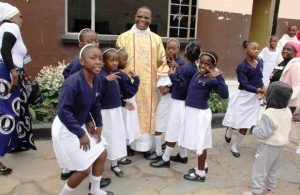Two years ago, the Colombian government and the FARC signed a revised peace deal which put an end fifty years of civil war.
After four years of formal peace negotiations, the Colombian Government signed a final peace accord with the FARC in November 2016, which was subsequently ratified by the Colombian Congress. The accord called for members of the FARC to demobilise, disarm, and reincorporate into society and politics. The accord also committed the Colombian Government to create three new institutions to form a “comprehensive system for truth, justice, reparation, and non-repetition,” to include a truth commission, a special unit to coordinate the search for those who disappeared during the conflict, and a “Special Jurisdiction for Peace” to administer justice for conflict-related crimes.
According to Colombian priest Fr. Leonel Narváez, Consolata Missionary who founded and chaired the Foundation for Reconciliation (FR), the process of peace and reconciliation must have also the dimension of forgiveness: “It is erroneously believed that forgiveness is only a religious or spiritual resource, but forgiveness is also a political virtue”, he said.
In the framework of restorative justice, the Colombian father is working with his organisation to establish four programs with which it reaches the areas most affected by the conflict, both rural and urban, working alongside other civil and religious organisations. According to the religious, “true justice is that which rebuilds, and not the one that eliminates or punishes. In this sense, we are convinced that forgiveness is and will be recognised as a human right, both for those who offend and for the offended”.
Forgiveness, for Father Narváez , is “a process of introspection in which the victim gives a new meaning to the memory of an offence and recovers personal security; at the same time it understands how to handle pain, without resentment or revenge”. Forgiveness, pointed out the missionary, has two sisters: justice that restores and compassion that strengthens. In fact, the priest concludes, “forgiveness is the most powerful medicine that a person can offer to himself: without forgiveness, the victim remains a victim forever”.
On the situation of his country, Fr. Leonel is optimistic: “The situation is complex, but we are in the delicate phase of post-conflict”. According to international experience, he notes, “it takes three to five years to reach a situation of normality” and 15 years on average for the full application of peace agreements. Currently there are still criticisms related to the justice system, in this phase of transition, but we are in a moment of progressive stabilisation: we will find peace, calmly”, he hopes. “Patience” is the watchword. “People tend to think, that the day after the signing of peace, everything is in order, but peace is to be built. Peace is like a baby, who at the beginning is very fragile, then grows and strengthens itself”.






